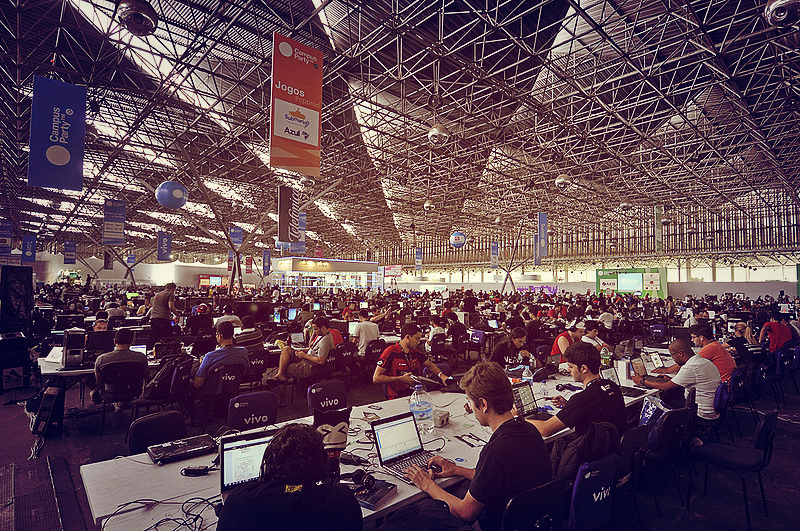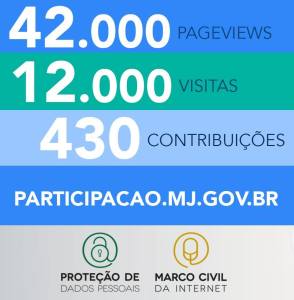
InternetLab Reports – Public Consultations No. 03
On February, 11t, the public consultations about the Marco Civil da Internet regulatory decree and the Data Protection draft bill reached their second week. InternetLab continues to report these procedures, focusing on relevant updates about the ongoing discussions (click here and here to access the analysis about the opening of the public consultations and about the first week of it). The number of participants and contributions continues to grow, but the depth of the discussions has now balanced.
Beyond the importance of such procedure in terms of policy decision-making, what seems to be at stake is the construction of a culture of public discussions. Many users disregard the general usage guidelines of the platform (which is provided by the Ministry of Justice), what indicates that this kind of open debate is not something customary. Thus, it is vital to encourage practices of interactiveness and to provide guidance (legal or not) on confuse and troublesome topics.
Numbers and statistics
The online platforms of public consultations are acquiring new users. The updated numbers (until February 11) shows that the website has 707 registered users (28% more in one week) and 11.914 visits (increase of 40% in a week). The predominance of the Southeast region continues, with Sao Paulo leading the visits share (33%).

During this second week, the Marco Civil regulation discussion received the majority of the contributions, reaching 204. However, the Data Protection draft bill debate still has the bigger amount of posts, 219.
Marco Civil regulation: net neutrality and “zero rating” still on the agenda
The hottest topic in the public consultation about the regulation of Marco Civil da Internet continues to be net neutrality, specifically the discussion about banning or not “zero rating” initiatives and mobile broadband. The discussion promises to go on for some time, and is shifting to the public sphere. This week, the subject was one of the main debate topics at Sao Paulo’s Campus Party, as the arguments of each side have started to outline.

The first argument to raise at the public consultation is whether such business arrangements that allow free access to some apps are positive or negative from the perspective of the user. Some argue that poorer consumers can benefit from these initiatives, but this internet experience fragmentation is likely to produce “different internets” as the user’s income increase or decrease.
Secondly, some raise questions about how should be the antitrust approach to “zero rating” initiatives. Business agreements among telecommunications companies and large application providers would pontentially strength monopolies (increasing barrier costs to competitors to reach its users) or would the competition be preserved as long as there is no exclusivity between these telcos and large app providers?
The public consultation in the website of the Ministry of Justice has not received contributions among stakeholders yet, such as the interest groups, civil society and the academia. Scenes from the next episode.
Data Protection: exceptions for data processing “for journalistic purposes”?
In the discussion of the Data Protection draft bill (click here to access the english version proveded by the Ministry of Justice and the Article 19 organization), several users raised questions about the Article 2, § 2, item II . This section deals with a legal exception to the Data Protection provisions, whenever data processing is “performed exclusively for journalistic purposes”.
Contributors asked for clarification about the reasons for this exception and what would be considered the meaning of “journalistic purposes”. Basically, their concern focus on how to balance the freedom of the press and the privacy rights.
To improve the discussion about this balance, the InternetLab asked for a comment of Taís Borja Gasparian, an attorney who represents at press and journalism cases. The reason behind her contribution is to allow users to understand the existing legal framework of press freedom in Brazil and to provide a discussion material to further discussion, as follows.
Protection of sources and the right to privacy
The first point is the difference between what is considered to be reporter’s privilege and what is the limits of the right to privacy, which is the main focus of the draft bill.
Commentary: Taís Borja Gasparian (media lawyer and partner of Rodrigues Barbosa, Mac Dowell de Figueiredo and Gasparian LLP)
The confidentialty of sources is safeguarded by Article 5, XIV of the Brazilian Constitution. Since the approval of the Constitution and during the latter democratic governments, this principle has been respected in our country. However, it is important to mention a recent case about the subject, ANJ (National Association of Newspapers) v. Federal Court (STF, complaint 19.464). The case started when the judge of the 4th Federal Court of Rio Preto ordered the disclosure of the telephone records of a journalist, as to know who would have disclosed him an information he wrote in a story previously published in a regional newspaper. The ANJ proposed an appeal to revert this holding based on previous case law settled by the Brazilian Supreme Court (such as the ADPF 130).
Protection of personal data, except in news stories
The possibility of using personal data in news stories is not something new in the Brazilian law. The subject already receives a legal approach.
Commentary: Taís Borja Gasparian (media lawyer and partner of Rodrigues Barbosa, Mac Dowell de Figueiredo and Gasparian LLP)
The use of personal data by the press is absolutely prohibited only when the personal data is related children (Children and Teens Statue, “ECA”, art. 143). In other cases, it is necessary a balance between the freedom of the press and the the rights to intimacy, privacy, honor and image. There is no specific rule defining when personal data should or should not be disclosed, as judges have a general reasonability approach to handle such lacunae, which generally is balanced with parameters such as (a) why the disclosure is necessary in such situation, and (b) if there is a public interest involved. Generally, whenever there is a conflict between private and public interest, the latter would prevail.
Definition of “journalistic purposes”: what is a journalist?
With the increase of blogging and microblogging activities, how general should be the exception created by this bill? The wording is broad and give room to different interpretations, which has been criticized by public consultation participants.
Commentary: Taís Borja Gasparian (media lawyer and partner of Rodrigues Barbosa, Mac Dowell de Figueiredo and Gasparian LLP)
It is increasingly difficult to establish what is and what is not a press release or a news story. Citizen journalism (as has been routinely called the contribution of people to information) makes it virtually impossible to draw a carthesian line about the subject. In general, blogs runned by journalists (with or without a diploma, but unionized and recognized as such) or blogs supported/hosted by media companies are considered to be journalistic information. News published on social networks are not likely to fit in this definition. in other cases, which are surely numerous, it is necessary to adopt a case by case approach. However, it is clear that the wording adopted at the Data Protection draft bill is inadequate, since it creates this kind of misinterpretation.
Authors: Francisco Brito Cruz and Jonas Coelho Marchezan